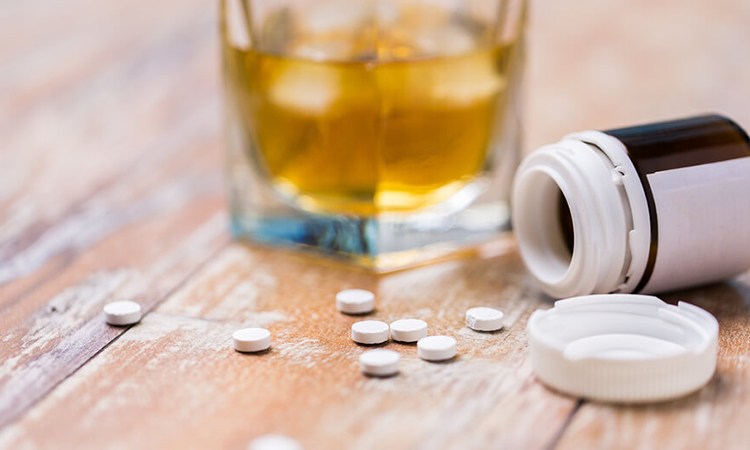
Adderall and Alcohol – Adderall (amphetamine and dextroamphetamine) is a prescription medication that is indicated for the treatment of ADHD (attention deficit hyperactivity disorder). Because Adderall contains potent stimulants that are effective for medical purposes at prescribed doses but can be harmful when abused, the Drug Enforcement Administration (DEA) classifies Adderall as a Schedule II controlled substance.
Stimulant medications work by increasing the availability of excitatory neurotransmitters (norepinephrine and dopamine) in regions of the brain that, when activated, improve focus and alertness.
Alcohol, on the other hand, works to inhibit the function of the neurotransmitter N-methyl-D-aspartate (NMDA) while simultaneously improving the function of the inhibitory neurotransmitters gamma-aminobutyric acid (GABA) and glycine. Alcohol is a central nervous system (CNS) depressant that, when abused, produces symptoms such as dizziness, euphoria, loss of inhibitions, and fatigue.
Combining these two substances is considered by some sources to be among the most dangerous combinations of intoxicants, but unfortunately, it is also one of the most common. Some people who consume this mixture of stimulants and alcohol do so unintentionally, while others do so to get high.
People who consume these two together with the purpose of getting high may falsely believe that Adderall and alcohol offset each other since they are two different classes of intoxicants. While a stimulant can mask a few of the symptoms of alcohol intoxication, such as fatigue, it does not prevent the body from being influenced by alcohol or from experiencing its effects.
The Dangers of Combining Adderall and Alcohol
When a person combines Adderall and alcohol, they may experience the following symptoms:
- Increased body temperature, possibly up to hyperthermic levels
- Rapid or irregular heart rate (arrhythmia)
- Changes in blood pressure, especially elevated
- Psychosis or paranoia
- Nausea and vomiting
- Muscle twitching
- Headaches
- Impaired coordination that can lead to dangerous falls or injuries
- Loss of inhibition and impulsivity leading to poor decision-making
Stimulants like Adderall can somewhat camouflage the depressant effects of alcohol. This means that using these two substances together can prevent a person from recognizing how much alcohol has been drunk because the stimulant masks the slowed down, tired sensations of being intoxicated. Because the individual cannot feel how intoxicated they truly are, taking both substances at once can easily lead to alcohol poisoning.
Symptoms of alcohol poisoning include:
- Extreme confusion or forgetfulness
- Blacking out (loss of memory)
- Nausea and vomiting
- Seizures
- Depressed or irregular breathing
- Blue-tinged, cold, or clammy skin
- Changes in body temperature
- Stupor – being awake but unresponsive
- Being unrousable after falling asleep
Adderall can also cause the body to process alcohol more rapidly, increasing how fast a person becomes intoxicated. This effect can more easily lead to alcohol poisoning.
Very severe, dangerous side effects of combining alcohol and Adderall include:
- Cardiovascular problems, including cardiac arrest, stroke, and damage to blood vessels from hypertension
- Amnesia and other memory impairments due to extreme intoxication
- Head trauma, bruises, or broken bones from serious falls due to impaired coordination
- Psychosis, paranoia, and hallucinations that can result in extreme aggression or erratic behavior
Who is More Likely to Combine Alcohol and Adderall?
College students may be more likely to mix Adderall and alcohol than anyone. Many students use Adderall illicitly to maintain a sense of focus during all-night study sessions. Although research suggests that Adderall does not increase focusing capabilities or learning in those who do not have ADHD, it is a commonly held assumption that taking stimulants such as Adderall will help a person to stay awake while cramming for a class or exam.
College students are also more likely to consume large quantities of alcohol at parties, bars, or social events, even when they are underage. If a student has used Adderall to study, then attends a party and drinks, they could seriously injure themselves, suffer from alcohol poisoning, or die.
Drinking alcohol is a common component of polydrug abuse, and polydrug users may mix alcohol and another drug of abuse, such as Adderall. Polydrug users may also combine other substances, including cigarettes, marijuana, and more.
This form of substance abuse is prevalent among amphetamine abusers, including people who take Adderall. This abuse can be used as a method of enhancing the high from Adderall, or to temper the effects of other substances so that the amphetamines are less likely to cause paranoia or aggression.
Treatment for Drug or Alcohol Addiction
If you are currently abusing Adderall and alcohol, you are urged to seek treatment as soon as possible. Our center offers an integrated approach to addiction treatment that includes essential therapeutic services such as psychotherapy, psychoeducation, individual and family counseling, group support, and more.
We employ compassionate addiction professionals who deliver these services to clients with care and expertise. Our staff provides clients with the knowledge and resources they need to achieve abstinence and enjoy long-lasting sobriety and wellness.
You can reclaim the fulfilling life you deserve free of substance abuse! Call us today to find out how we can help!
Related: List of Stimulants and Their Effects